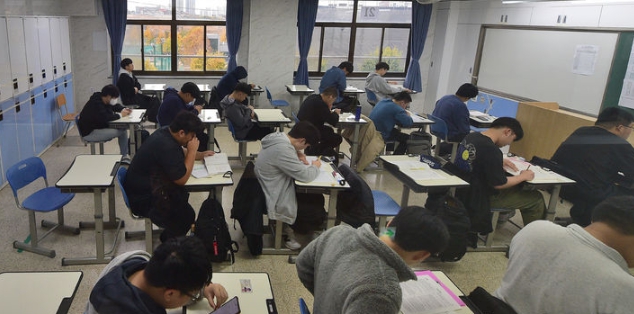
Every November, South Korea comes to a standstill for a singular event that shapes the future of its youth: Suneung, formally known as the College Scholastic Ability Test (CSAT). This grueling, day-long exam is the pinnacle of South Korea’s highly competitive education system, determining university admissions and, by extension, future career opportunities. Revered as a national rite of passage, Suneung dominates not only students’ lives but also the nation’s collective psyche, with entire cities adjusting their routines to ensure test-takers can perform their best.

On the day of the exam, the nation goes silent as businesses open late, flights are rescheduled, and traffic is controlled to ensure students have the optimal environment for success. Yet, this intense focus also contributes to stress, mental health challenges, and debates about whether the system’s rigidity stifles creativity and broader personal development.
“The Pressure Behind Suneung”
The Suneung wields immense influence over South Korean society, shaping cultural norms, family dynamics, and even the nation’s economy. As a determinant of university admissions, the test creates a high-stakes environment where students, starting from a young age, endure relentless academic pressure and grueling study schedules. Families invest heavily in private tutoring and cram schools, often at great financial strain, to secure an advantage for their children.
The Suneung assesses students on subjects such as Korean language, mathematics, English, and social or natural sciences over the course of nearly eight hours, including breaks. Unlike in the U.S., Korean students can attend medical school directly after high school. This year, the number of exam takers increased due to the expansion of student admissions in Korean medical schools, making competition more intense.
“The Call for Education Reform”
After completing the exam, students often gather with friends or family to relax, celebrating the end of a long preparation period. This year, Suneung was noticeably easier than last year. One student, Dohoon, shared his thoughts after finishing Suneung: “It feels weird that what I’ve been doing for three years ended all of a sudden. The level was around hard to intermediate. The test was a little hard, especially social studies.”
For those who aren’t satisfied with their scores, the option remains to take the exam again the following year, which many students choose in hopes of admission to their desired universities. The future of Suneung will shape South Korean society as it balances tradition with the need for reform. While it remains central to education, its focus on standardization risks stifling creativity and adaptability in a changing world. Growing awareness of mental health and inequality is driving calls for a more holistic system. Shifting away from high-stakes testing could ease societal pressures and promote inclusivity, but maintaining academic excellence will be key to navigating this transformation.
![]()
<Student Reporter Jaymin Park> jpola0412@gmail.com
Jaymin Park is a student in Palos Verdes High School






